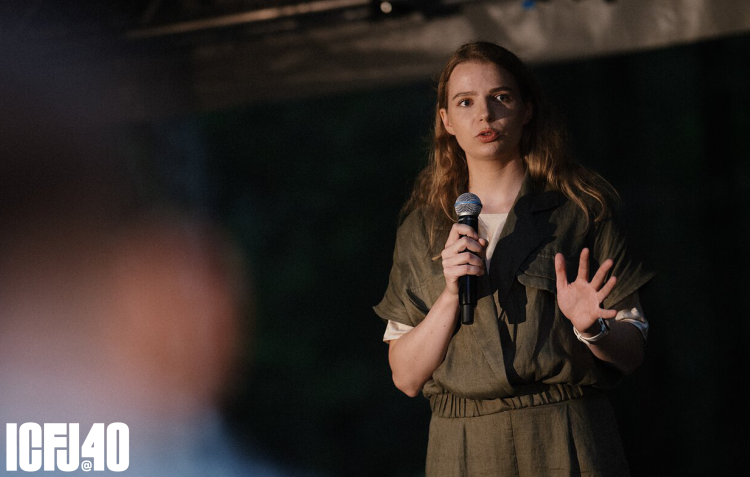Aistė Čiučiurkaitė is a Lithuanian video journalist whose work focuses on the Baltics and the war in Ukraine. She covers a variety of topics, including politics, business and entertainment.
Through an ICFJ study tour in the United States, Čiučiurkaitė covered the U.S. midterm elections in 2022. After that experience, she found work with AFP and Reuters.
“As a journalist, I believe that the democracy-based principles of U.S. journalism are necessary for us, and we need to be constantly reminded of them,” she says.

This interview has been edited slightly.
How have you been involved with ICFJ over the years?
Together with the U.S. Embassy in Lithuania and the ICFJ Baltic Study Tour, I traveled to the U.S. in the autumn of 2022, where I undertook a wide range of interviews, filmed reports, got acquainted with different cities and their cultural aspects, and had the opportunity to see the midterm elections up-close and to show it to a Lithuanian audience.
What was the biggest outcome from participating in the program?
2022 was the first year of the war in Ukraine. That autumn saw the U.S. midterm elections, which are crucial for our region. It was a coincidence that the Baltic study tour was in full swing, and in Washington, New York and Chicago I was able to get a glimpse of what life is like for Americans and Lithuanians in America. Not just to read or see from afar, but to ask questions for myself. Both in the U.S. and on my return, Lithuanian media interviewed me as a colleague who had just returned from a major NATO ally and asked me what civilians were saying, how government officials saw the war situation from afar and how the elections were influencing it.
At the time I went on tour, I was studying for a master's degree in politics and freelancing for three media outlets. After returning from the tour and noticing what was needed in video journalism, I got an offer from Lithuania's second-largest media outlet to lead their video team. Now I work with AFP and Reuters; I know what they need when they ask for video from our region, because in the U.S. I talked to Reuters representatives and they expressed their needs.
What is something impactful you have worked on since participating in an ICFJ program that you are proud of and would want to highlight?
With the help of my colleagues from ICFJ and the Consulate General of Ukraine in New York, I conducted an exclusive interview with Serhiy Kyslytsia, Ukraine's representative to the United Nations. He had not talked with any Baltic media outlet before.
For me personally, one of the most enriching encounters was with Lincoln Mitchell, whose newsletters I still subscribe to, and when a Russian missile landed in Poland, I interviewed him on geopolitical transformations.
Also, my Estonian colleague Alexander Algo and I are still in touch. He was in Vilnius for the NATO summit, and I was in Tallinn; we exchange news and media updates, contacts, once a year or more often.
Why is it so important right now to provide the kind of support to journalists that ICFJ does, especially in the Baltics?
Geopolitical shifts and the loyalty of the Baltic States to the U.S. since independence are the reasons to cooperate with journalists working in the Baltic States. The voice of U.S. politicians, political analysts, commentators and other experts can reach the Baltic population through journalists, as we now have mostly secondary sources of information on what the U.S. is concerned about.
As a journalist, I believe that the democracy-based principles of U.S. journalism are necessary for us, and we need to be constantly reminded of them. I want to show what the media in the U.S. can do in order to maintain a strong democratic voice in our countries. And that is difficult to do, because there is a daily flow of Russian disinformation.
In addition, at least in Lithuania, investigative journalism has been given a new lease on life. It is expensive, but effective and transformative. I myself have been one of the authors of an environmental investigation in which we caught and filmed a criminal who has been polluting the forests for decades and contributed to investigations into the corruption of a government minister, into holograms produced in Lithuania by a company linked to Alexander Lukashenko [the president of Belarus].
What kind of difficulties as a journalist have you faced in Lithuania?
Too strict data protection, protection of journalists (especially in investigations, I was once asked to look over my shoulder for a while after an investigation and not walk alone after dark), lack of money, the language barrier, using AI tools.
Why did you choose to become a journalist?
As a child, the feeling of injustice was the most irritating thing. I was always on the side of what I thought was right, so I always said I would become a lawyer. But in my teenage years, my dad and I used to talk more and more about political events in Lithuania and the world; my grandparents were exiled by the Russians to Siberia, so the family scattered and the few survivors remained in Lithuania. So I subconsciously combined my search for truth and my interest in politics, and journalism came out.
What’s one piece of advice you’d give to an aspiring journalist?
Try everything a professional environment has to offer. As a head of video production in the media, I find that more often than not, aspiring journalists are offered opportunities and do not take them. Therefore, I encourage you to try all the opportunities, to interview, to not be afraid of the cameras and to remember your main goal as a journalist.